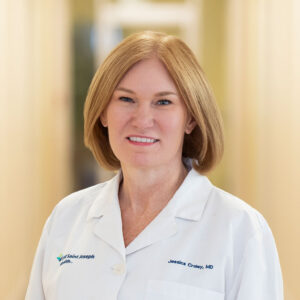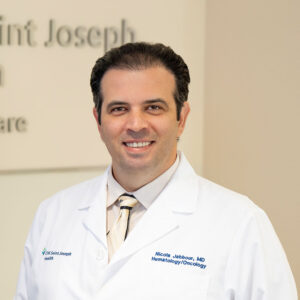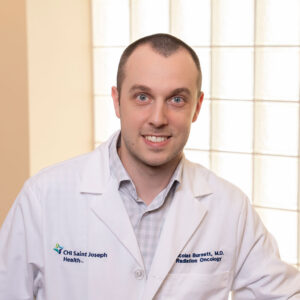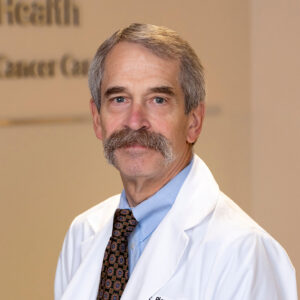Saint Joseph Health – Cancer Care Center provides people-centered care in a newly renovated space
LEXINGTON The Saint Joseph Health – Cancer Care Center in Lexington is just one aspect of what CommonSpirit Health sees as its vision of cancer care in the Central Kentucky region. Saint Joseph Health is a member of CommonSpirit.
At a ribbon-cutting event earlier this year, the center showcased the unified medical oncology services that the hospital feels will provide the region with more accessibility and convenience for its patients. Jessica Croley, MD, Saint Joseph Medical Group – Cancer Care, says the new medical oncology suite is a healing environment for patients and caregivers and recognizes the importance of “people-centered care.”
“People-centered care adds a focus on the health and well-being of entire populations or communities, aiming to improve healthcare systems and access for all. Ensuring that all demographics and geographies have access to the most effective, least toxic therapy for their cancer and the support they need to complete it,” she says. “The team here at Saint Joseph Health excels in bringing not only new technology, but also social workers, nurse navigation, financial assistance, and nutrition services to all.”
In addition to the Cancer Care Center at 3470 Blazer Parkway, Suite 300 in Lexington, the Center also provides radiation oncology at 701 Bob-O-Link Drive, Suite 120, in Lexington. The Center provides access to the latest cancer screenings, advanced treatments, comprehensive support services, and oncology specialists, Croley says.
DJ Bodziony, market director, oncology services for Saint Joseph Health, says the facility is just one of several cancer care centers in the state. In partnership with Croley, the two maintain a strategy of what the Centers will provide and how they want them to grow.
“We’re looking at opening additional cancer care sites where we see the greatest needs are to reach patients, and what new treatments and therapies we can bring to them,” says Bodziony. “We have a team of directors and managers that work to make the doctor’s job easier, so they can spend their time seeing patients. It’s a great opportunity in Kentucky to continue to improve not only the patient experience, but the treatment offerings.”
Bodziony became market director of the oncology service line at Saint Joseph Health in April 2025. He previously served as regional director for the oncology service line at CommonSpirit Health in Denver, Colorado. For him, working in oncology is all about the patient.
“Working in cancer is very rewarding, because almost everyone has been impacted by cancer in some way,” he says. “You have the opportunity to care for the entire family and not just the patient. That is what drew me to cancer care. We want to take care of the patient medically, but we also want to be sensitive to the fact that this is a really rough patch in their lives and do what we can do to make that experience a little better for them.”
A Family Connection to Cancer Care
Croley, a medical oncologist and hematologist for Saint Joseph Health, has been in practice for 12 years. She grew up in Muhlenberg County in Western Kentucky and attended the University of Kentucky earning her bachelor’s degree.She stayed to earn her medical degree and did her residency at UK. Since completing her training in 2013, she has been with Saint Joseph Health.
Her cancer-treating journey began when her father was diagnosed with sarcoma. “I was a sophomore in undergrad when he was diagnosed. At the time, I was looking at potentially a career in genetics or biomedical engineering,” she says. “I pivoted from the scientific side of healthcare to the clinical side. Just seeing his interactions with his surgical oncologist and staff as he went through his cancer journey, it became very obvious to me that this is what I was meant to do.”
During her time at Saint Joseph Health, she felt she could be of more use as the Cancer Center’s medical director.
“I had served as the chair of the cancer committee for several years in Lexington, but as we started looking more as a system across our cancer centers, I saw that there was a need to standardize the care that patients were being offered wherever they were,” she says. “As much as I love clinical medicine, there’s only so many patients I can see in a day. I felt like those same approaches that I took with my new cancer patients were needed for every patient and that they should be offered those same opportunities.”
Those standards and opportunities were then applied across the system. On top of treating patients according to national guidelines, the Saint Joseph Health cancer centers started a market-wide tumor board process where all the doctors participate in several disease specific tumor boards where new cases are presented. There the group develops the most complete and effective treatment plan for each new patient.
New Member of the Team
Nicola Jabbour, MD, medical oncologist, and hematologist at Saint Joseph Health – Cancer Center, says the initial meeting with patients is an important part of determining how to treat a patient.
“Oncology is a tricky specialty because the first meeting is about building trust,” he says. “During the first meeting, I spend a lot of time listening to the patient, their personal story, what their expectations and goals are, what their medical history is before I get into the cancer diagnosis. After that, we talk about the staging and the prognosis in a language that they can understand. That’s very important, because no matter how smart the oncologist is, if the patient doesn’t feel the trust and doesn’t feel the connection, they will not be as invested in their treatment.”
Jabbour was born in France, and his family moved to Syria when he was a child. After high school and college in Latakia, Syria, he came to the United States to do his medical training. His internal medicine residency was at the University of Illinois at Chicago, and his oncology and hematology training were at the University of Connecticut.
In 2010, Jabbour came to Hazard, Kentucky, establishing a cancer center for Appalachian Regional Health, ARH. In 2014, he moved to Danville to work at the Commonwealth Cancer Center, and in 2024, he joined Saint Joseph Health.
Part of the challenges facing oncologists in Kentucky, Jabbour says, are the comorbidities they see in patients. Heart disease, diabetes, high blood pressure, obesity, along with poor diet, smoking, and lack of physical activity, all contribute to cancer rates and cancer diagnosis.
“These conditions can impact both the cancer risk and also the treatment outcomes,” he says. “In my practice, I usually address them on two levels. First, I try to integrate treating those comorbidities into treatment planning… to ensure that the patients can tolerate and benefit from the cancer treatment safely. The second level is to focus on education and prevention, realistic steps that they and their family can do. We are not only treating their cancers, but also trying to support their overall health and quality of life. The goal is to empower these patients in their journey to fight the cancer with tools that can hopefully make them live longer, with better lifestyles beyond their cancer journey.”
Jabbour says treatment options start with conservative medically appropriate approaches, like nonsurgical treatments, and then in some cases move to more aggressive treatments when necessary.
“For example, in some breast cancer cases, systemic therapy could be hormonal therapy, or chemotherapy, or targeted radiation therapy to shrink the tumor,” he says. “That will hopefully help the patient avoid more extensive surgery. In other cases, we might need to do the surgery up front as an initial step, followed by other treatments. The decision is always individualized based on the cancer biology, the patient’s health, and the patient’s preferences. I involve the patient in every step of the decision-making process. The best treatment plan is the one that is not only scientifically sound, but it is also aligned with what matters most to the patient.”
New treatment options and therapies continue to evolve in oncology. “This is all important, and it is an exciting time now for medical oncologists, surgeons, and radiation oncologists because the pace of progress is directly improving outcomes for the patients that we see every day,” Jabbour says.
Radiation Is a Treatment Option
From highly targeted drug therapies that are matched to a tumor-specific molecular or genetic profile, to directed therapies like CDK inhibitors and PARP inhibitors, new treatments allow oncologists to more effectively treat the specific cancer, while minimizing side effects. Additionally, oncologists use less invasive techniques that remove targeted areas, like lymph nodes in breast cancer cases, which reduces complications. Highly targeted radiation treatments mean fewer treatments with lower doses of radiation, improving the procedure’s safety. Focusing on personalized care can not only treat the cancer, but also preserve the quality of life, bodily function, and body image.
Nicolas Burnett, MD, is the radiation oncologist at the Saint Joseph Health – Cancer Care Center. The Murray, Kentucky, native received his undergraduate degree from the University of Louisville and his medical degree from the UofL School of Medicine before heading to UK for his residency. His practice primarily consists of breast, lung, prostate, and rectal/anal cancers.
Burnett highlights some major advancements is his specialty area. “In rectal cancer, we have moved toward using combination chemotherapy and radiation to offer eligible patients a chance to avoid surgery which previously was not widely available. For advanced breast cancer patients, we can often deliver treatment in three to four weeks now, rather than five to six weeks. And for eligible prostate patients, we can give higher doses of radiation directly to the tumor without increasing the side effects of treatment leading to better rates of control and cure,” he says.
Burnett states that there’s conflicting information published about the role of radiation in oligometastatic and oligoprogressive disease. Some studies show benefit; others show no difference. “The short answer is, we still don’t know exactly which patients will benefit from it and which won’t. For now, we still offer a fair amount of stereotactic body radiation therapy, SBRT, for this population. Some patients will see a true benefit to their cancer outcomes, but in others there are ancillary benefits such as improved pain control and reduced treatment toxicity.”
Meet Scott Pierce, MD
Scott T. Pierce, MD, is a hematologist and oncologist with Saint Joseph Health at the Cancer Care Center. Pierce graduated from the University of Wisconsin-La Crosse, then received his medical degree from the University of Illinois College of Medicine at Chicago. He did his residency and fellowship training at the University of Kentucky and joined Saint Joseph Health in 1993.
His wide-ranging patient population includes lung cancer, chronic leukemia, breast, gastrointestinal, and prostate cancer. Pierce credits advances in molecular profiling with developing more targeted therapies for his patients. Immune checkpoint inhibitors “release the brakes on immune cells, empowering T-cells to recognize and attach to tumors,” he states.
CAR T-cell therapy, which extracts a patient’s own T-cells, then modifies the cells genetically before they are reinfused to the patient, has produced high remission rates for specific leukemias and lymphomas, notes Pierce.
Many doctors can identify with Pierce’s view that “as an oncologist in Central Kentucky, one of the primary challenges is confronting some of the nation’s highest cancer incidence and mortality rates, especially in rural Appalachian counties.”
“This situation is made worse by patient access issues, health disparities, and specific risk factors associated with the regional population. Patients in rural communities often face significant travel times to reach oncology centers and specialty clinics in urban hubs like Lexington. Many cannot afford the gas or do not have a reliable vehicle for long-distance travel,” say Pierce.
The Future of Cancer Care at Saint Joseph Health
Bodziony says that focus on patient-centered care will continue as the Cancer Center looks to the future.
“Future growth is driving the strategic vision,” he says. “From cancer screening through cancer survivorship and everything in between, bringing specialties and subspecialists into one oncology program where we create a comprehensive program for patients, with physicians talking to each other, creating multi-disciplinary care, and where we have one common vision for all those different providers and specialties.”
That level of care seems to be growing. In 2024, the Cancer Care Center saw 936 patients. In 2025, they’ve already seen 1,021. In addition to locations in Bardstown and London, the center has additional outreach sites in Mount Sterling and Corbin and is looking at additional care sites in Berea and Jessamine County.
The mission, Bodziony says, will remain the same.
“We exist to meet the needs of all patients that need our care,” he says. “We strive to work with patients on any insurance needs that they have and to make sure that we can find a way for them to be seen here. We want to make it easy for the patient by bringing all the providers together. That way, the patient can focus on healing and getting better.”








